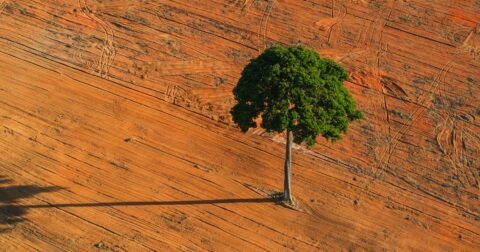Feature
The Meat Industry’s Hidden Link to Wildfires
Climate•6 min read
Analysis
The environmental impact of animal agriculture is hard to ignore. “Eating Our Way To Extinction,” a new documentary narrated by Kate Winslet, shows us why.


Words by Mieke Leenders
The time for the effects of animal agriculture to join the conversation about ecological collapse is long overdue. For decades, the environmental impact of animal agriculture has been blatantly ignored, but “Eating Our Way To Extinction,” a new documentary narrated by Kate Winslet, finally draws the topic to the foreground. The film lays bare the inefficiency of our food systems, climate change, species extinction, hunger, poverty, and disease, putting them all in the context of how we have used and abused earth’s resources to feed our growing population.
The film doesn’t waste any time and shares one staggering study after another. The first 10 minutes reveal the film’s main point: switch to a plant-based system to help reverse the damage caused to our planet. In an attempt to show the destructive impact animal agriculture has on every facet of our ecosystem, the documentary approaches our broken food system from every angle.
Consumption of meat, dairy, and fish is scrutinized throughout the film, and bold numbers about humans and their patterns of consumption are thrown into the mix. The documentary claims that if we don’t regain control of our food system, our already declining fresh water supplies could dry out by 2050, and by 2030 only 10 percent of our forests would remain. Fish consumption is one of the film’s more deeply explored topics. The directors Otto and Ludovic Brockway specifically examine its relation to ocean depletion, plastic pollution, and our health. Undercover footage shows disease-ridden fish farms, ocean soils covered in a poisonous sludge, and fish being sprayed with possibly highly toxic material in an attempt to ward off lice and illness long enough for the fish to make their way to our plates.
The documentary also draws attention to what extinction would mean for different communities around the world. Beyond the effect on our planet and its decline in biodiversity, “Eating Our Way To Extinction” adds a social justice dimension to its narrative by introducing us to members of Brazil’s Indigenous communities and the threats they face as animal agriculture continues to expand into the Amazon. Similarly, communities in Mongolia and Taiwan are shown battling the elements as Mongolian lakes are drying up, and extreme weather rages through Taiwanese mountain villages. The message that more vulnerable communities will be affected first by climate change is brought home with footage of climate change refugees who are seen trying to climb over the Spanish borders in a desperate attempt to find a home within more stable surroundings.
However, the wide net cast by the directors tends to undermine the more nuanced approaches to certain parts of the film. Some sections are rushed through, while others are briefly dropped to be picked up again later, which makes me wonder whether the documentary itself is really a quandary over the complexity of the animal agriculture debate.
In just 81 minutes, the documentary introduces the destructive effects of animal agriculture-related to land use, loss of biodiversity, mass extinction, land rights of indigenous tribes, corruption, ocean depletion, pesticide usage, plastic pollution, climate refugees, the greenhouse effect, pandemics, antibiotic resistance, health, extreme weather, and freshwater shortage.
While this method does shine a light on intensive farming as a leading cause of our current crisis, at times it raises more questions than it answers. For example, in the short section discussing veganism and health, Dr. Shireen Kassam, Consultant Haematologist at King’s College Hospital, UK, states that “even those who are not the most healthy vegans” are healthier than those consuming meat and dairy, without expanding on what qualifies a good vegan diet. People may then ask themselves, “Oh, so vegans can be unhealthy? What does this mean?” Especially since they had just been told that vegan nutrition can go as far as to reset the harmful effects of an animal-based diet. The narrative leaves almost no room for experts to expand on concepts like “fast food vegans,” and they even neglect to mention the harmful substances that can be found in highly processed meat replacement products, or “faux meat.”
Within the vast array of topics covered, the recurring message calls for personal responsibility and lays bare the self-interest and corruption that control world governments and subsequently, the food chain. The film urges us to switch to a plant-based diet while also picking up the banners and furthering the conversation beyond the walls of our home. The issue is personal, the film clarifies, but also systematic.
I have been a vegan activist and advocate for many years, and while my primary reason to go vegan was animal welfare, I was gradually introduced to the complexity of animal agriculture’s role in the climate crisis. Thinking back to how scientific reports and books were slowly guiding me through my journey, I wonder how “Eating our Way to Extinction” will affect people who were hearing these arguments for the first time.
Rather than informing deeply on one topic, the film is a launching pad for a wider debate and creates awareness about how broken and inefficient food systems are connected to some of our biggest ecological and social problems. The film could have been extended beyond its 81 minutes or even serialized so each section could have received its fair amount of nuance and attention, but regardless, animal agriculture seems to have finally found its way into the conversation.